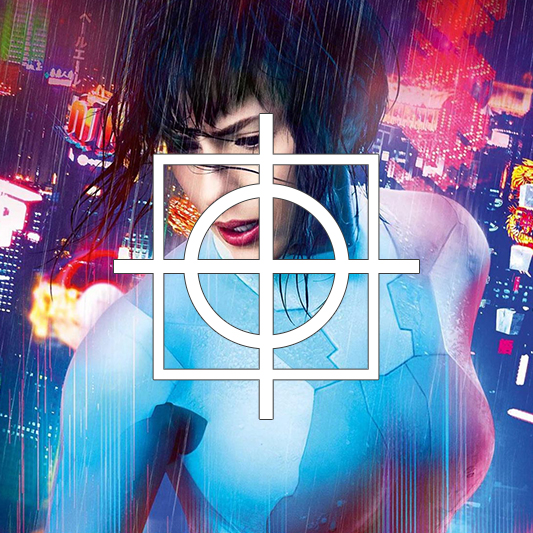Official trailer of film “Ghost in the Shell”
1. 故事
電影《攻殼機動隊(こうかくきどうたい, Ghost in the Shell), [0]》從女主角自昏迷中甦醒,重新獲得意識的那一刻開始,向我們揭示了一個幾乎完全脫離原生肉體,並被植入虛假記憶的人如何重新獲得自己存在意義的旅程。這是一個“非人”或者非傳統意義上的“人類(homo sapiens)”獲得新人格與獨立意識的故事。
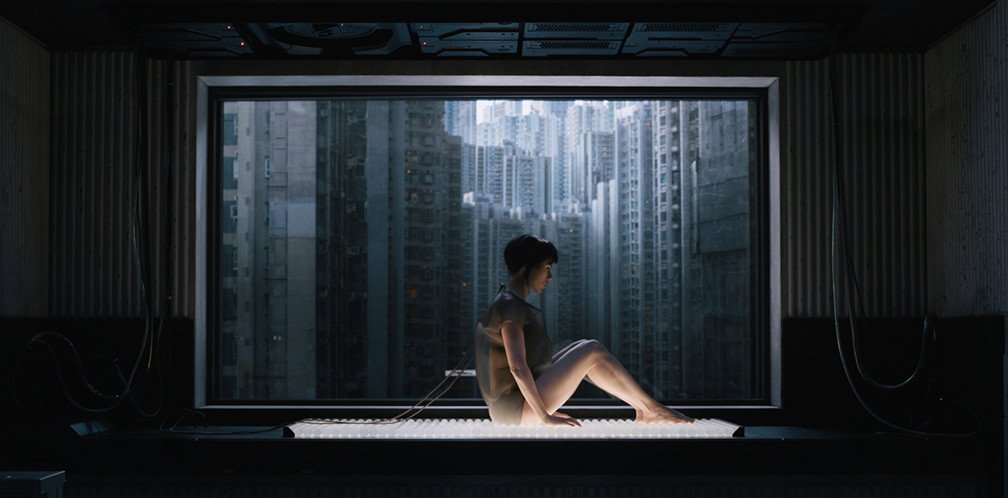
Still from film “Ghost in the Shell”
2. 疑問
在影片中設定的未來世界裏,由於科技發展,人類可以通過植入高科技電子設備,甚至把大部分身體變成電子機械等手段,獲得肉身無法直接擁有的技能或性能,但隨之而來的,是人類對於自身存在意義的懷疑和對外部世界的深刻不信任: 如果我們的自我意識不是與我們的肉體形影相隨,自我們誕生於世界那一刻就開始萌生發芽,如果意識不是獨立於肉體之外的物化存在,那麽這些植入我們軀體的非肉體部分,甚至完全改變身體外部型態和內在構造的物件,是不是本身也會成為意識的一部分,並與原有意識融匯為一爐,甚至有可能替代原有的自我意識?
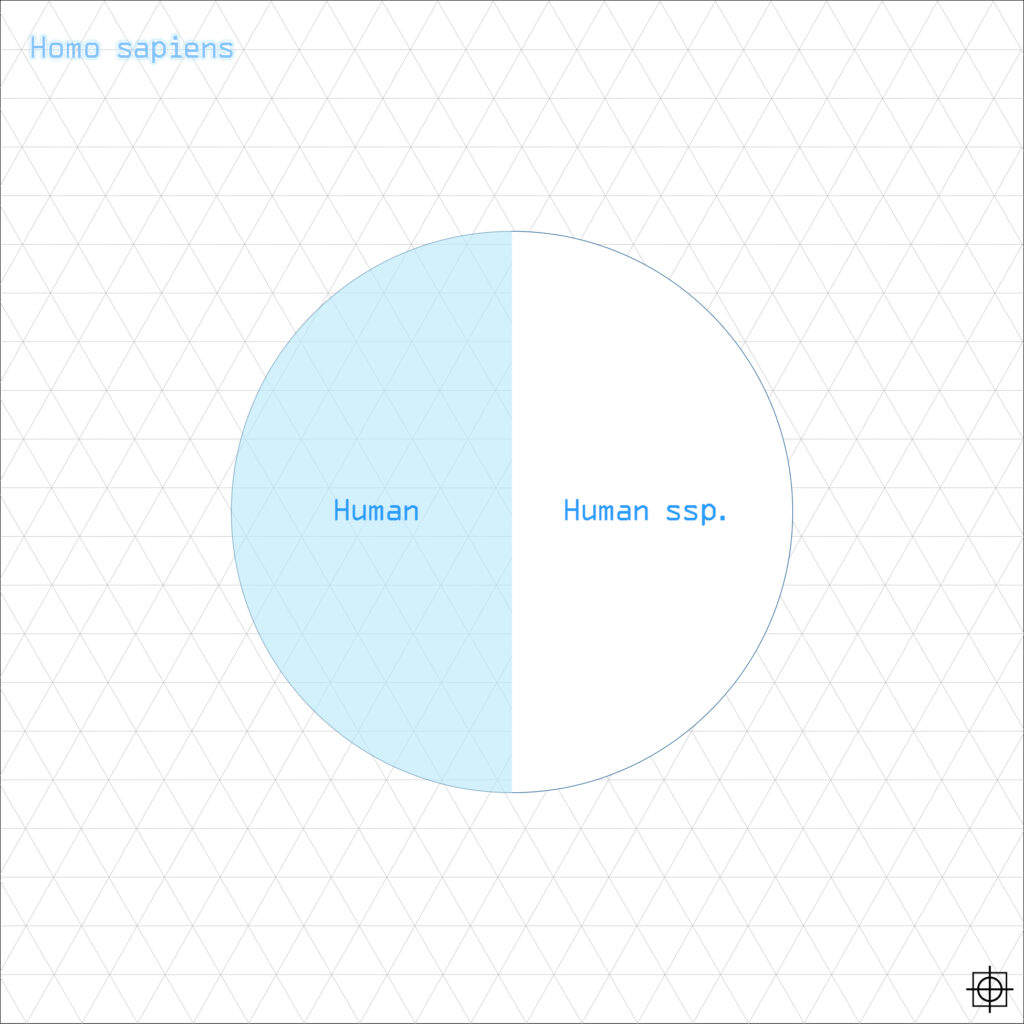
Human and his/her subspecies
那麽,什麼又是“自我(ego/self)”?
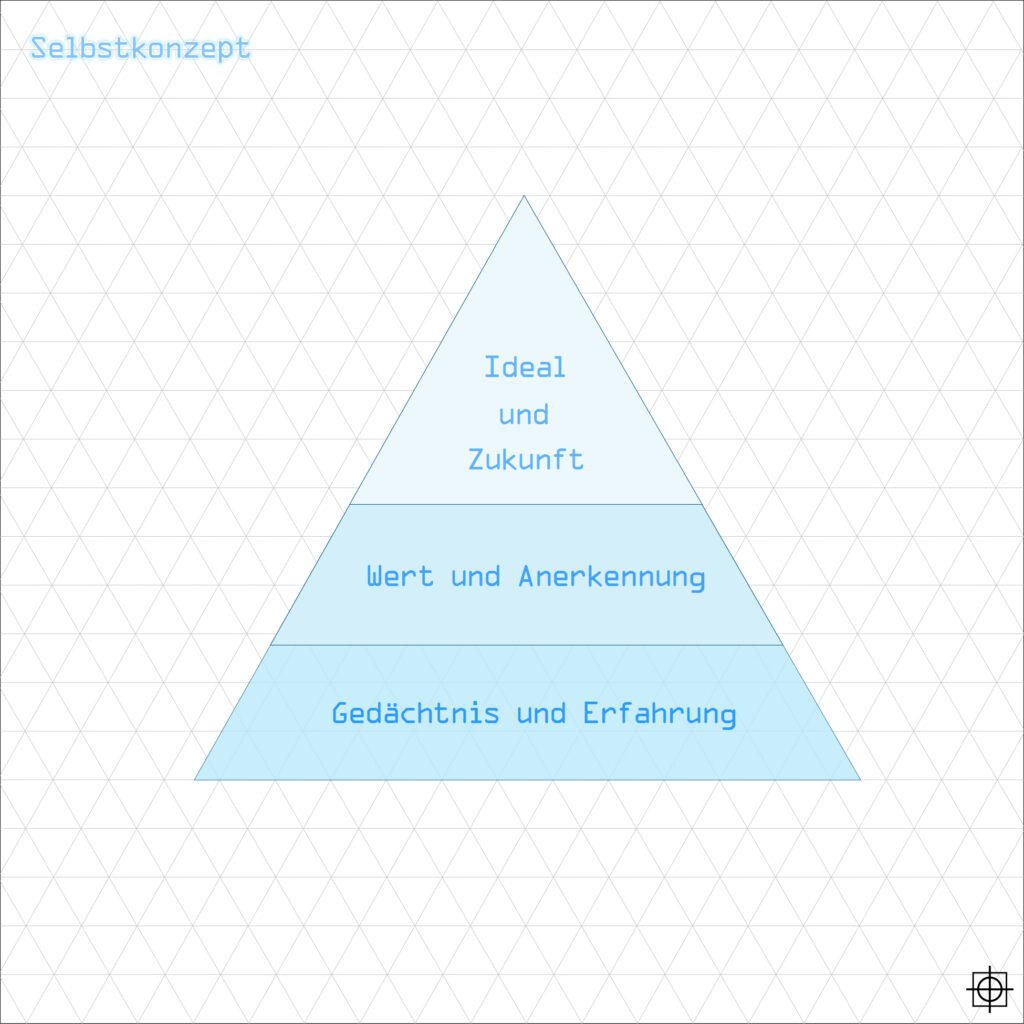
記憶與經驗、價值與認同、理想與未來
The triple structure of “Self”:
Memory & Experiences, Value & Recognition, Ideal & Future
3. 汝是誰
如果說,“自我”概念來自個人記憶與經驗的累積,自己對於個人價值的評估和認可,以及對理想自己與未來可能自己的期許–那麽所有對自己記憶、經驗、價值和理想期待的認識、反思和沈澱,才是自我意識產生的可能沃土及海洋。在有意識或無意識的思考和辨別中,在或明或暗的心理海溝底層,在不同記憶經驗相互混合、交叉反應的實驗室裏,在價值被不斷認識、解構、破壞並新生、重建的過程中,“自我”漸漸發芽成長,慢慢成為了個體在宇宙中立足和發展之堅實基礎。
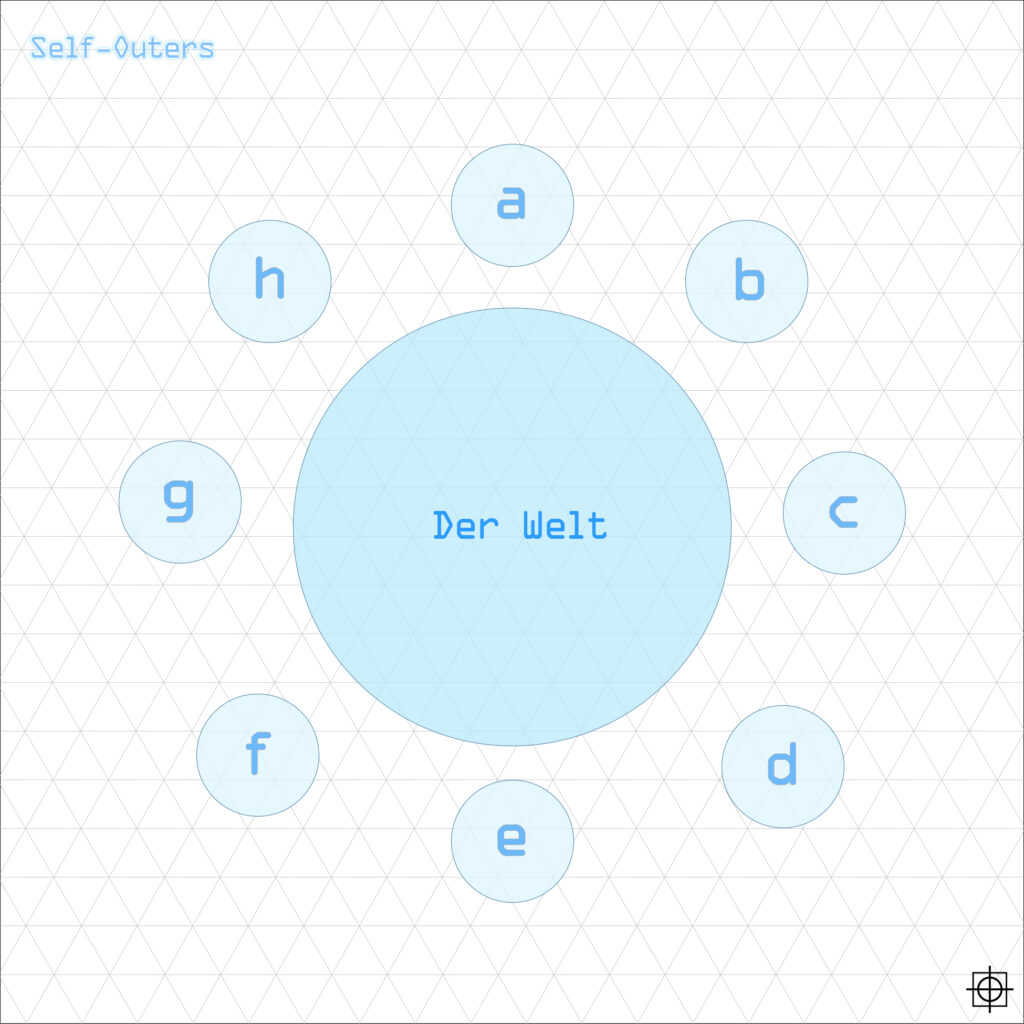
The relationship between “Self” & the outside world
4. 地穴寓言
“我思故我在(Cogito, ergo sum. Je pense, donc je suis. [1] 笛卡兒, René Descartes, [2])”, 沒有自我反思,沒有思考我們自身與宇宙、自然及外界的關係,我們人類就不足以證實自我存在的價值和意義;沒有自我反思,人類就不會在千萬年裏不斷調整自我與外界的關係,不斷進化和發展,更不會在遭遇困難和災難的情況下,維持種族的延續並開創出現今之文明。從某種意義上,世界不過是自我意識的一種映射,我們在自我反思的同時,也創造出一個反映自我對外部世界認知的交互影像,而這個世界的影像,就是古希臘哲學家柏拉圖(Plato, Πλάτων)提出的“地穴寓言(《理想國, Πολιτεία, Res publica》, 514a–520a, [3])”–世界不過是我們在幽暗的洞穴深處看到的幻影而已: 我們在反思中創造出自我意識以及對於世界的意識,在這些意識中,世界反射著它的鏡像,而我們的意識,也在其中加入自我認識之投影。所以,我們人類不僅僅在反思中獲得存在意義,也在反思中獲得了自我意識與外部世界的位置和關係。
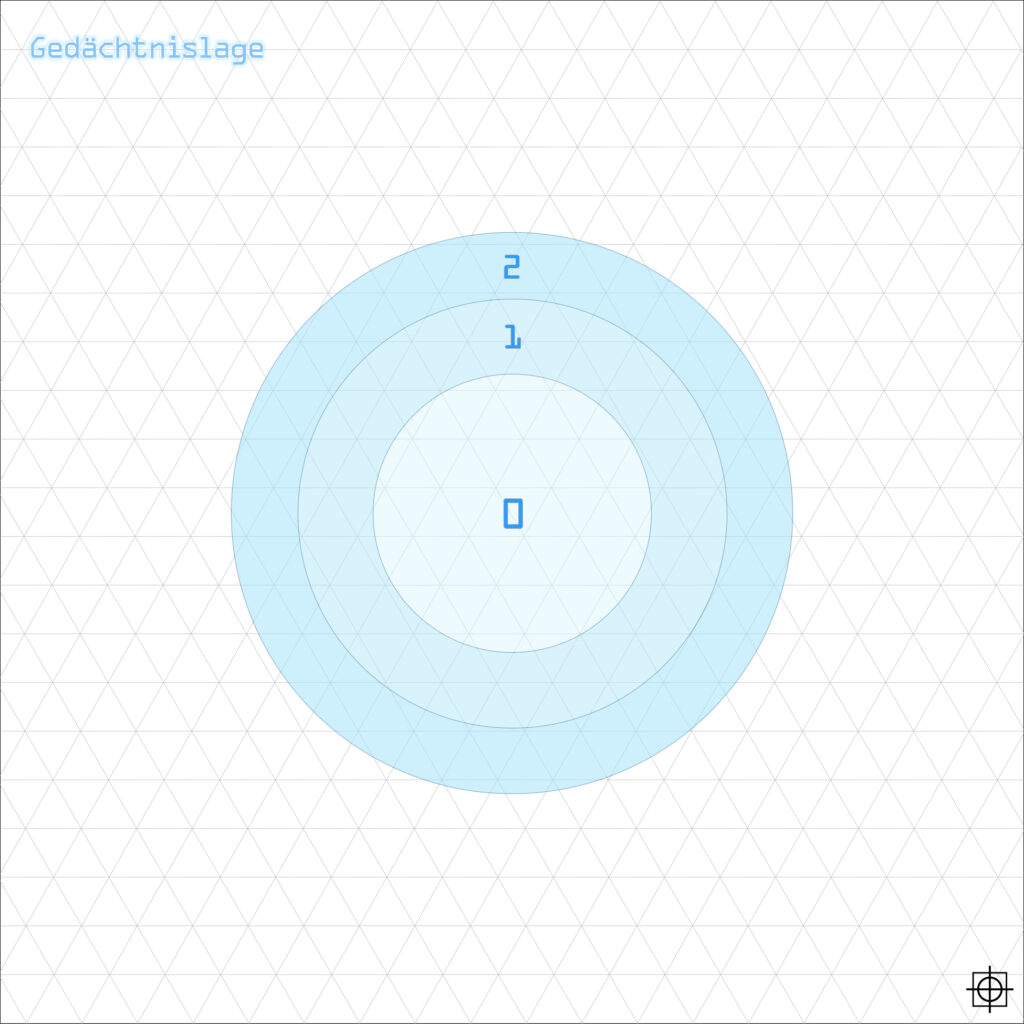
The different layers of memories
5. 生而為人之意義
影片中的女主角不僅僅是整個大腦被完美植入一個完全人造的軀體中,就連她的記憶,也被洗刷並植入另一個完全不同的版本。如果說經驗和記憶塑造人格與意識,那麽人工植入不相干的記憶就有可能塑造出特定的人格,如果說篡改歷史,就是干預、改變族群的群體記憶並塑造族群的性格,那麽植入記憶,也就是操縱記憶從而控制思想和人格,少佐(しょうさ, the Major, [4])在初始化新身體的同時,她的記憶同時也被格式化(formatted, [5]),一個和過去完全不同的人格誕生了。但是,就如同大地有不同的岩層,我們的記憶也分為不同的層次,既有表層、臨時而易被遺忘的淺層記憶(shallow memory)–我們可以比之為電腦的內存記憶體(Random-access Memory, RAM, [6]),也有掩藏在意識深海不為人知的角落,靜悄悄等待我們去發掘的深層記憶(deep memory)–只有在某些特定的時刻,這些隱藏在暗角裏的記憶才會從深淵中悠悠漫遊而出,在浮光掠影中被我們輕輕瞥見。凱莉恩(Killian)過去記憶剩餘的碎片和斷章殘簡時不時地在她的眼前浮現,執拗地提醒她追尋過往的經歷,而她也有此走上了探尋真實過去的道路。因為,任何謊言和幻影,都不能阻止一顆渴望探尋真相的火熱心靈,即使被一時被蒙蔽欺騙,她也會在懷疑、思辨和探索中發現真相。
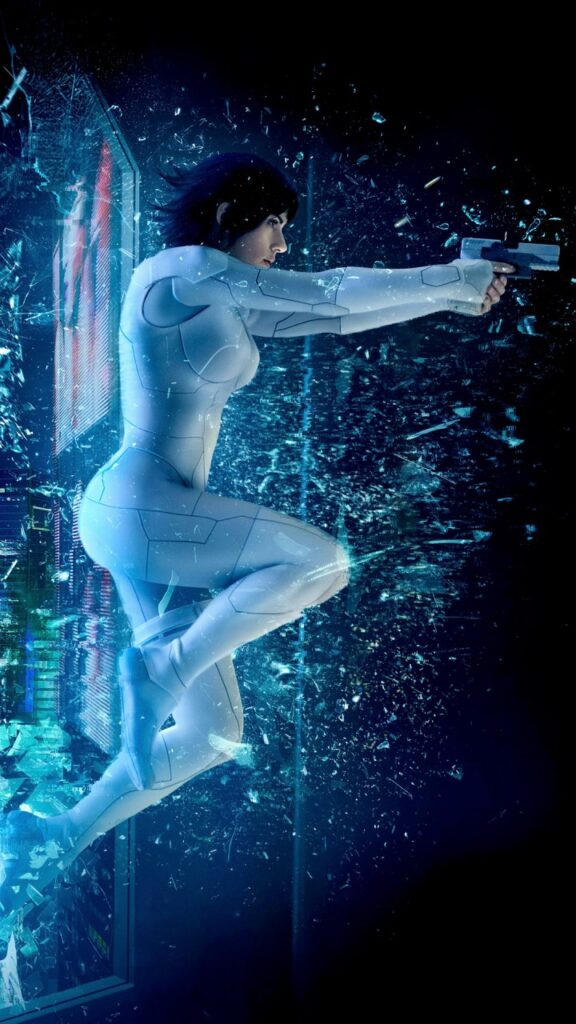
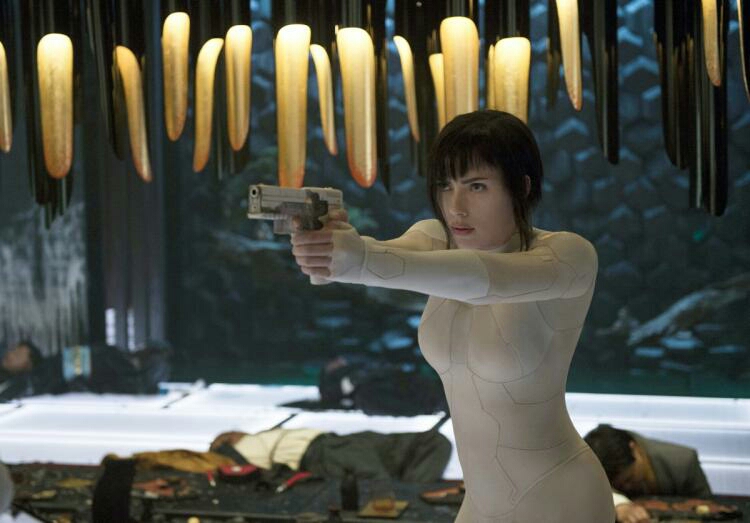
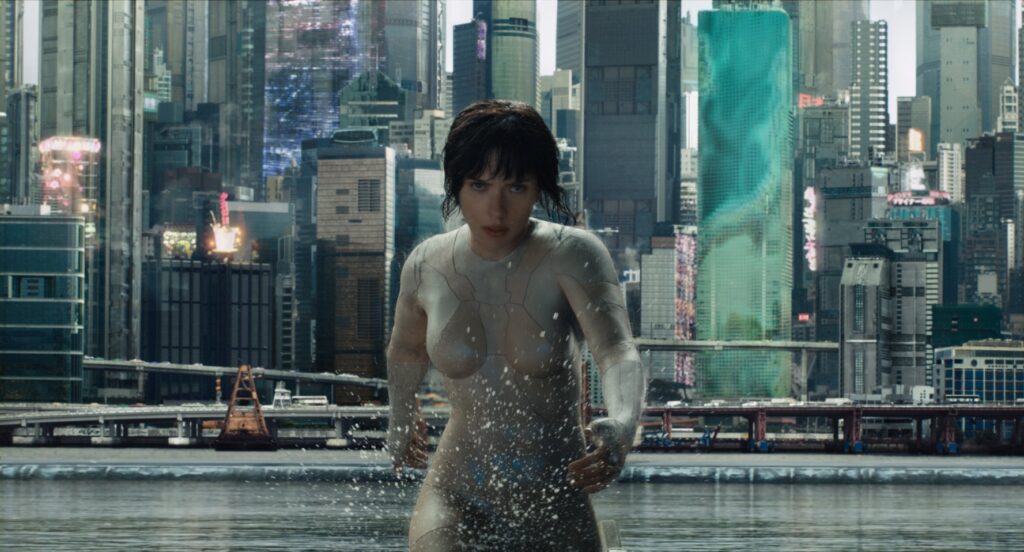
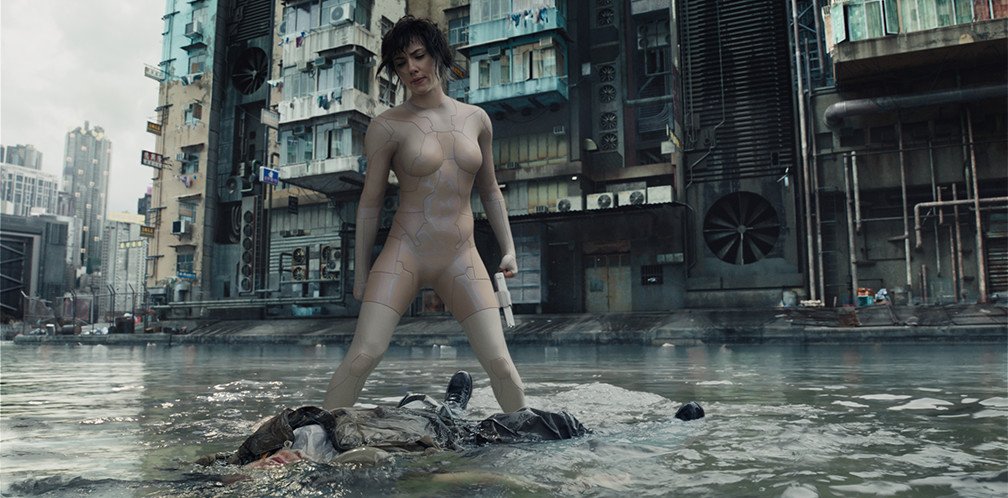
Still from film “Ghost in the Shell”
6. 多維之汝
如果說,記憶具有不同的層次,那麽被創造出的人格,同樣也具有不同的層次,舊有的人格和新生的人格相互交融,混合出具有完全相異,多重自在的全新人格。人格的不同層次有可能帶來混亂的人格,也有可能帶來多重的人格,或者,具有不同面目、能力和特點的人格。我們不會忘記,在某些特定的情況下,每一個人格可能完全沒有另一個人格的記憶或者性格: 許多在平日裏溫文爾雅、彬彬有禮的普通人,也許會在群體癲狂的暗黑盛宴上,變身嗜血、暴虐又殘忍的狂魔;一個完全忘記自己施暴經歷的人,幾乎就是完美、無犯罪動機的“無辜者”, 只有當另一個人格甦醒的時候,前段的記憶和經驗才有可能被重拾對接。女主角在復生以後,被改造成一個精通所有槍械武器、具有強大格鬥體術、冷靜又不乏冒險精神的特殊戰士,被植入與改變的不僅僅只是肉體與外表,還有她所固有的人格特點–只有在記憶的罅隙才偶爾可以遠遠窺見她曾經叛逆、嬌柔的少女時代之褪色姿影。
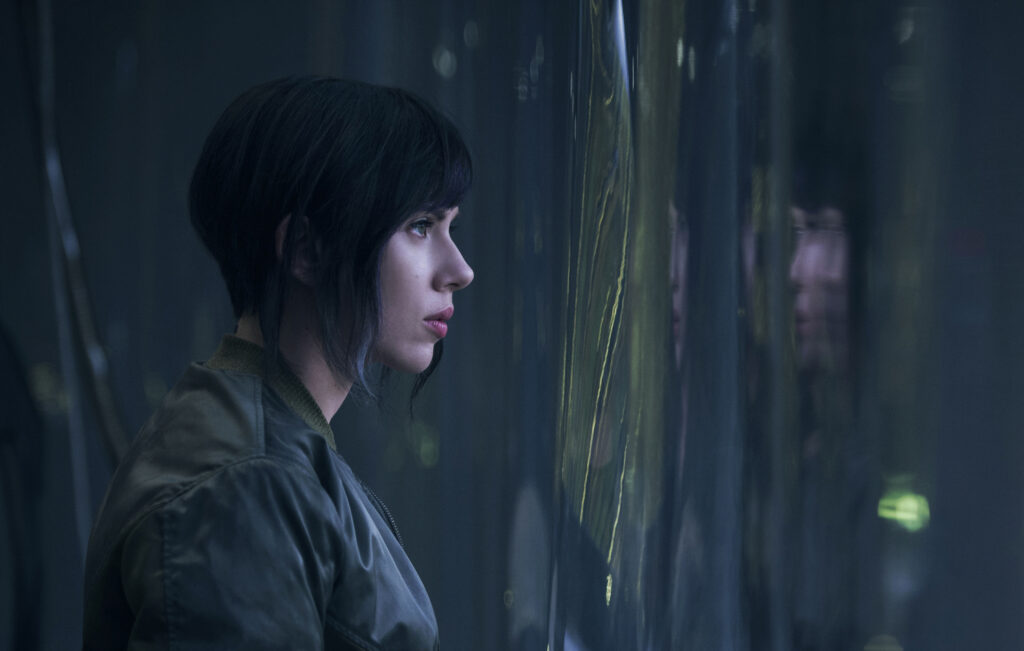
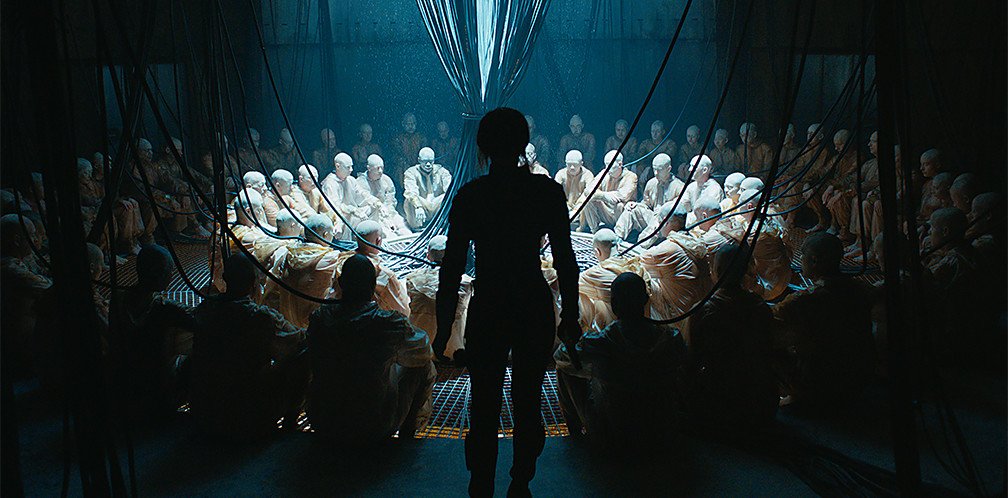
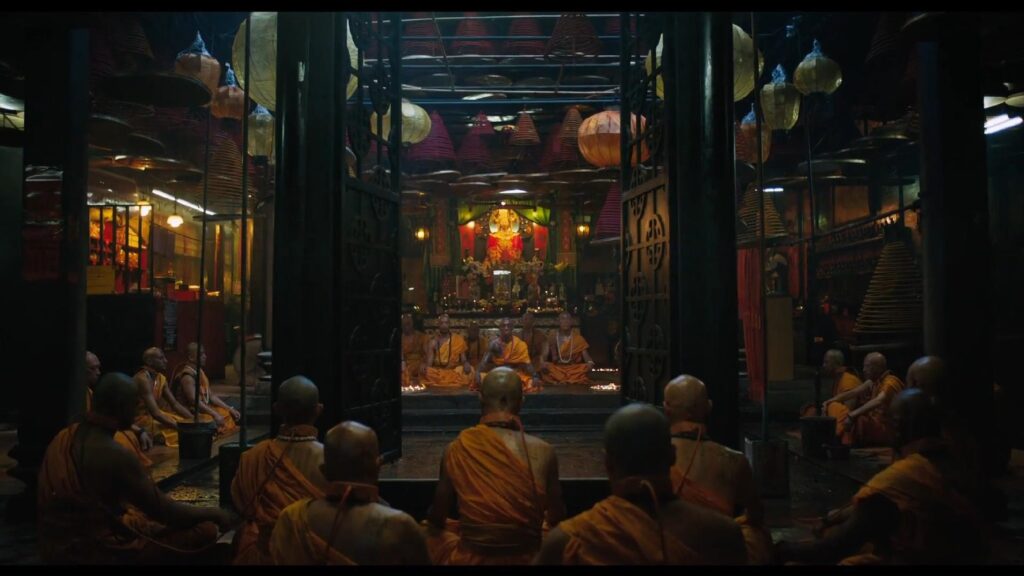
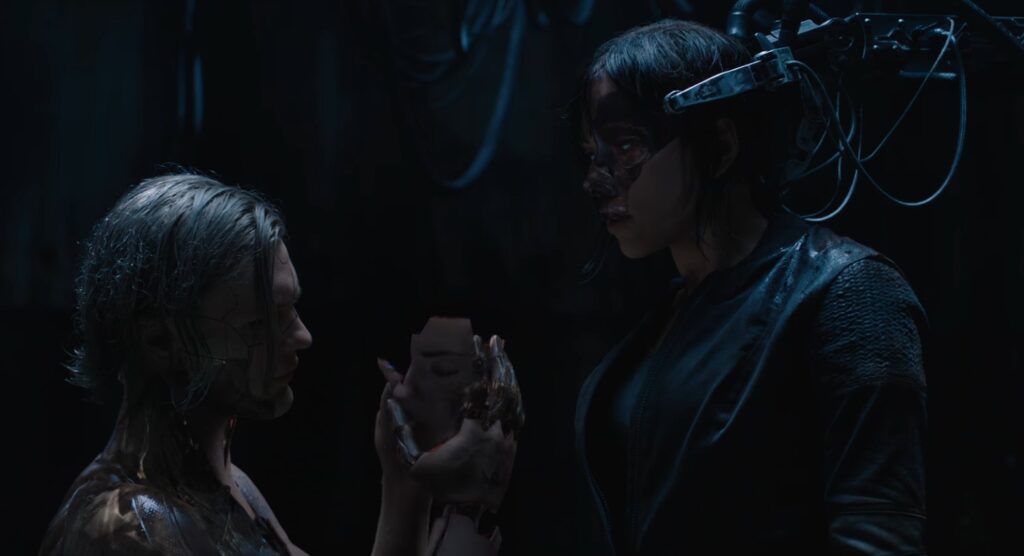
Still from film “Ghost in the Shell”
7. 造物主的小遊戯
如果說,我們的人格建構是基於我們自身可獲得的經驗,那麽,我們自身的經驗,同樣也在建構我們人生之可能,如果記憶和經驗的累積可以帶來新的技能和能力,那麽,植入的記憶和經驗同樣可以帶來不經過學習即可獲得的技能和能力: 揮汗如雨練習射門一萬次帶來的精準,日日懸掌揮毫帶來的自如書寫,每個清晨早起勤奮練聲帶來的飽滿渾厚,可能都不過是某個可以輕易獲得的模組(Modular)。如果我們的肉體也有記憶,就像是截肢的病人在手術後很長時間內仍然還有肢體之幻覺,我們的肉體在長期刺激和條件反射的訓練下,會不自覺做出本能的反應,大腦也並非是經驗與記憶的唯一載體–電影描繪了一個普通人可以通過植入外部肢體或者輔助設備獲得大量曾經因為天賦限制或者生理限制而無法獲得的能力,個體經驗的不可重複性悖論不再起作用,模組化的設備甚至可以使人類像不同的機器一樣適應不同的使用/生活場景: 需要快速移動的時候,我們可以在把下肢換成輪子;需要攀巖的時候,我們可以把雙手換成具有抓取能力的爪子;需要透視牆壁另一端的情形,開啟你眼睛上的 X 光透視能力就可以了。移植(設備、肉體和記憶)將賦予人類以部分造物主的能力。
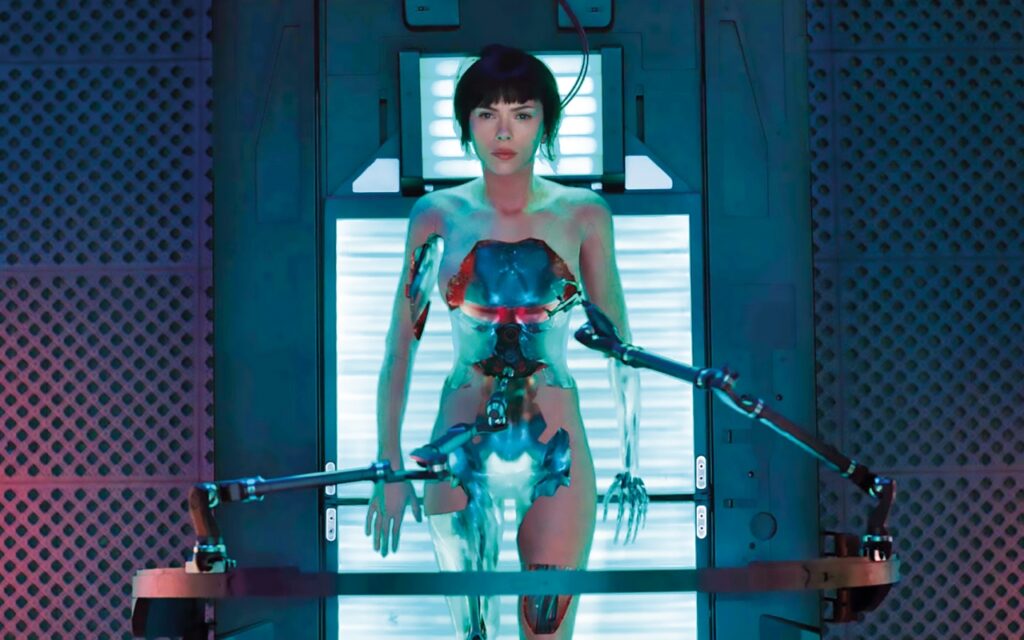
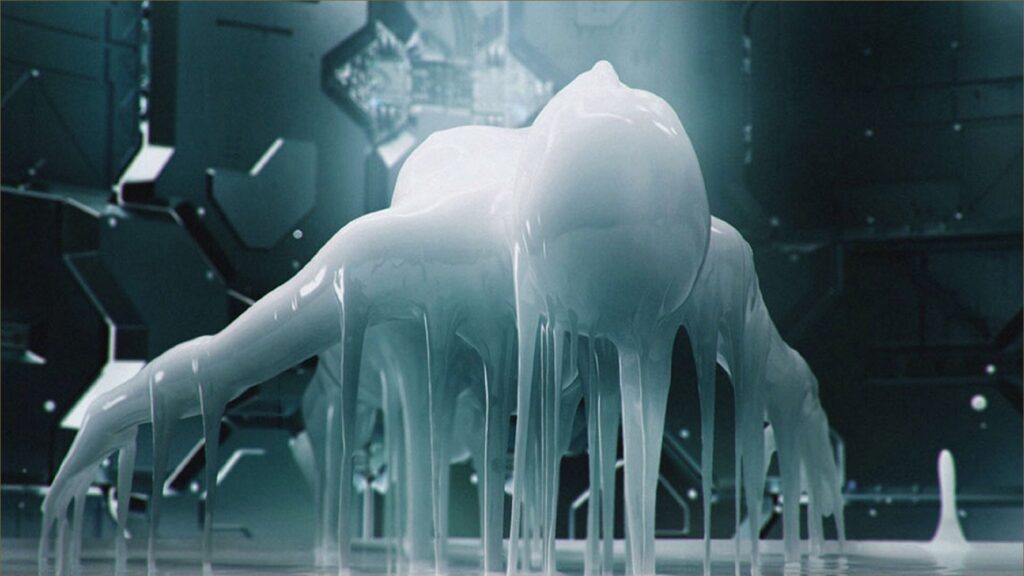
Still from film “Ghost in the Shell”
8. 科技 = Pandora‘s Box
面對科技發展的未來和不可控的發明,我們人類在打開這個潘朵拉魔盒的同時,是不是還釋放了未知的惡魔? 革命性發明對於人類文明和既成社會倫理規範又會有怎樣的影響? 電影的未來世界裏,在被少數大財團等壟斷企業控制的社會中,普通人類、人造人、部分改造的亞人族群居於同一個社會空間,有此帶來的觀念衝突和倫理困境,又該怎麼解決呢? 科技發明和變革也許只是一夜間的事情,但觀念的改變則可能歷經數個世代。不同的文化、宗教和歷史背景的純人類種族在一起相處猶能產生衝突矛盾,更何況介乎“人類”與“非人類”之間的巨大鴻溝? 頭腦裏移植入超級計算器的人在處理大量密集元數據的時候具有先天優勢,而這對於普通人公平嗎? 具有機械義肢、力量強大的人如果侵犯相對弱小的普通人該怎麼辦? 法律如何界定不同類別的人類並制定出適應所有人的公平法則? 在一個普遍植入外部輔助電子設備的時代,一個堅決保持純粹原生肉體的普通人,注定只能成為一個無足輕重的小人物,受盡歧視、欺凌和壓榨? 還是說,在這樣的時代,保留人類純粹、完整而脆弱的原生碳基肉體,才是某些高階層社會成員的標誌與特權? 人類社會既有的等級體系及隨之而來的種種偏見,是不是還會在這樣的時代左右著我們的判斷? 隨時隨地聯網的設備也給新興的網路犯罪、洗錢與恐怖主義活動提供了高效便利的平台,你永遠都不會知道某個經過的路人甲,也許就是大腦芯片被駭客滲透、入侵、植入並被惡意軟體控制後進行自殺襲擊的傀儡? 另外,大量普遍部署、無處不在的電子設備使實時、大規模的監控變得輕而易舉,並隨時隨地產生海量的個人數據,如果這些數據被大財團或者某些機構秘密採集並存儲、分析並挖掘,由此對個體隱私和人權的侵犯,又該怎麼有效阻斷並加以限制?–在一個完全數字化的時代,也許奧維爾(George Orwell, [7])筆下的“老大哥(Big Brother, [8])”將披上大財閥和壟斷集團的華麗外衣,實現赫胥黎(Aldous Huxley, [9])在《美妙新世界(Brave New World, [10])》裏構想的未來之夢?
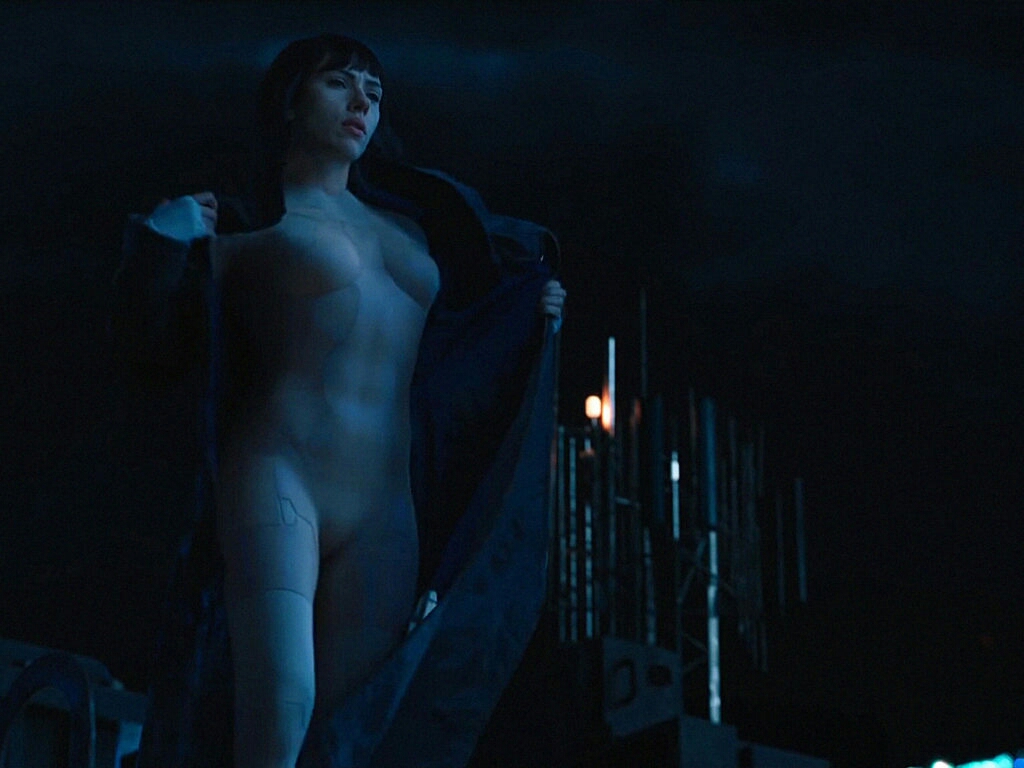
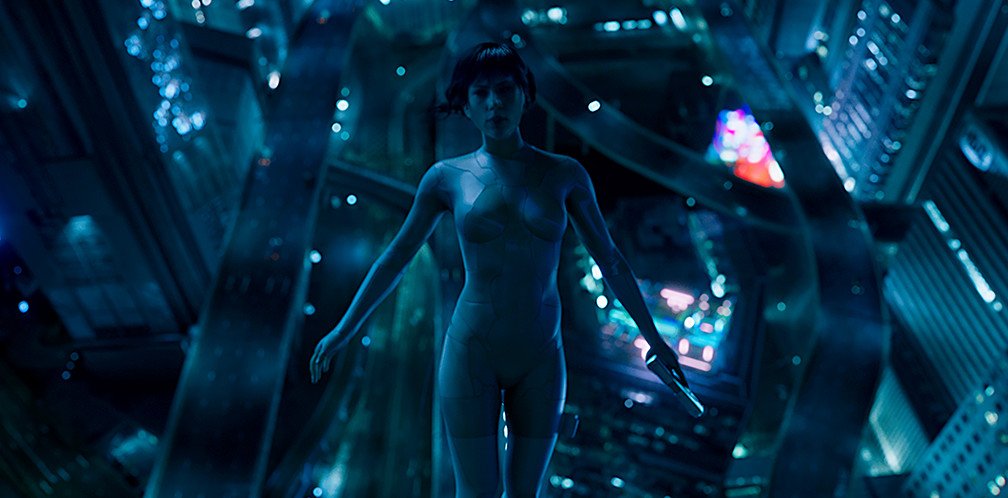
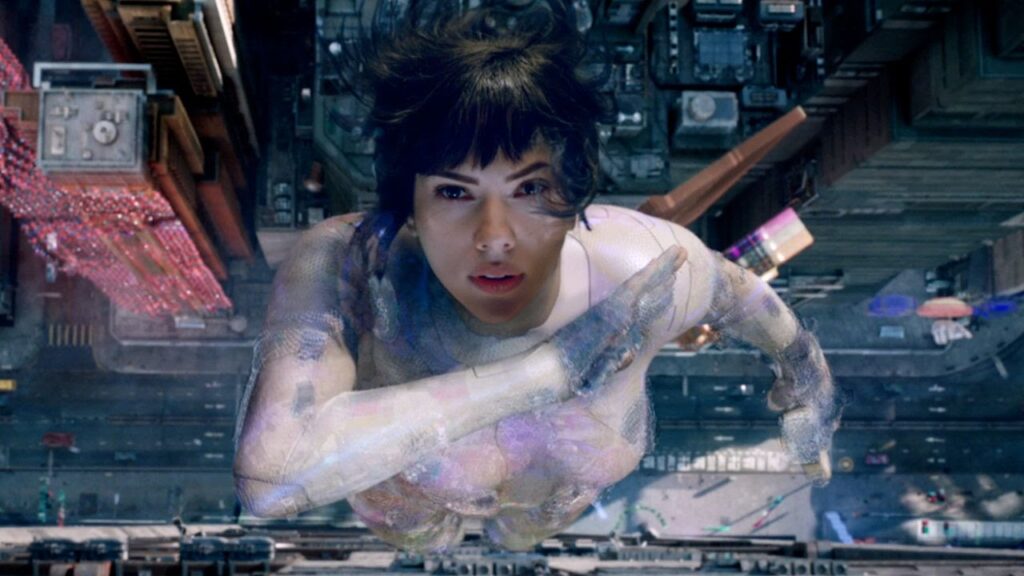
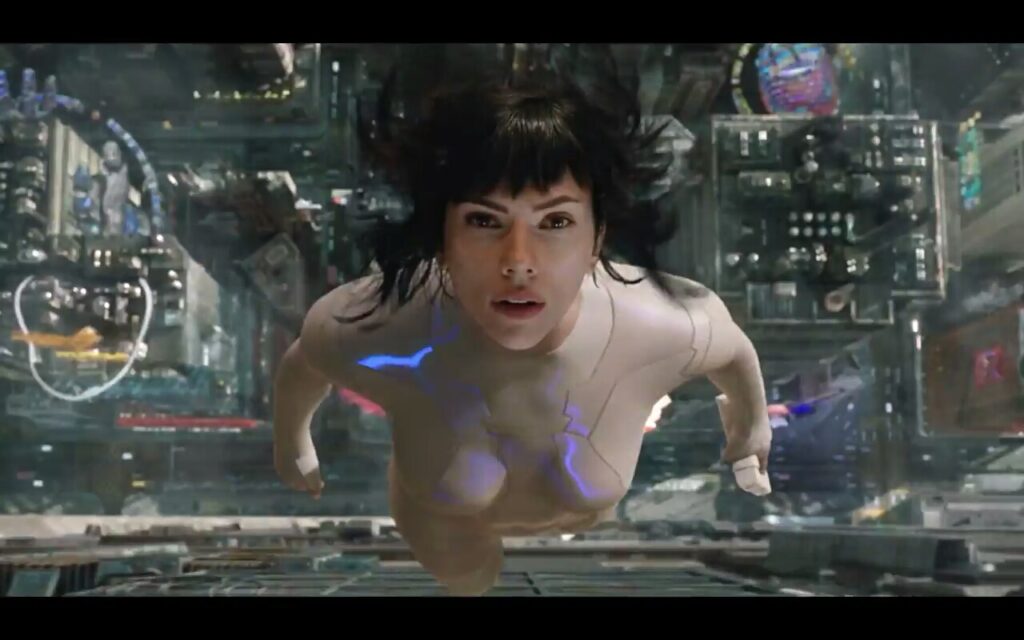
Still from film “Ghost in the Shell”
9. 関於未来
隨著今日人工(Artificial Intelligence, A.I. [11])智能的迅猛發展,我們有理由相信,在未來的某一天,這樣的社會生存圖景並不會陌生,人工智能在輔助人類的同時,也許埋下了另一個明日文明巨變的因子。克隆技術和高性能芯片技術的發展,將帶來了生物機器人/人造人的誘人未來: 也許,未來的某一清晨,一位從你身邊經過,令你心動不已的陌路美人,只是某個歷史名媛的高級克隆;一個在競技場上萬眾矚目的體育明星,卻是一個被植入特殊芯片,具有強化肢體的人造人–植入的外部設備和人工智能將對個體的人格產生怎樣的影響? 如果說,“我思故我在”, 那麽人工智能運算處理數據難道不能算是思考的一種方式嗎? 如果是這樣的話,輔助設備和人工智能將會促成新型混合人格(hybrid-personæ)的產生,也就是說,設備和人工智能將會影響人類的普遍存在意識,甚至,人工智能本身將具有獨立意識,那麽,它們未來和人類的關係,將變得更為複雜微妙、充滿變數,它們不再僅僅只限於在圍棋上擊敗人類–至於它們是否會產生取代創造者人類的問題,則有賴於我們如何塑造它們。畢竟,未來來自我們雙手之創造。
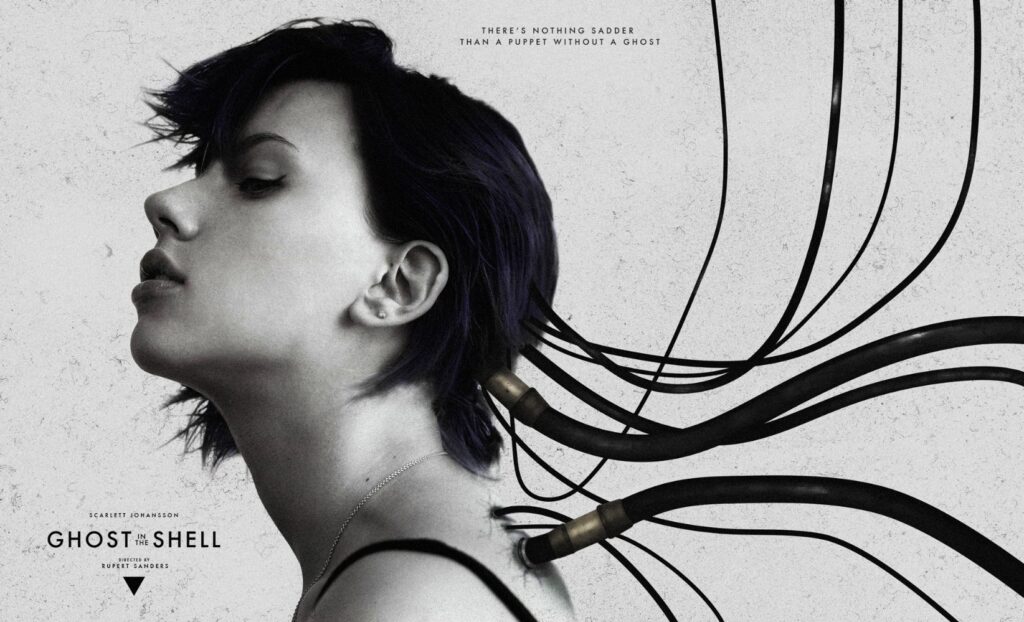
Still from film “Ghost in the Shell”
也許,記憶與意識,不過是人類在千萬年進化中產生的幻覺和幻影而已,而肉體和軀殼,更不過就是靈魂寓居期間,承載這份幻想的小小容器罷了⋯⋯
2017年六月十三~十六日, 2022年三月二十一日又識
註解
[0].《攻殼機動隊(こうかくきどうたい, Ghost in the Shell)》是由日本漫畫家士郎正宗於1989年首次連載的日本漫畫作品,之後因1995年Production I.G.製作、押井守導演的同名動畫電影而在國際名聲大噪。因出色的劇情、高品質的動畫和對哲學與社會學等深刻問題的探討而受到了普遍的好評,常被認為是日本動畫和賽博龐克(cyberpunk)的經典代表作。
[1]. 我思故我在(Cogito, ergo sum, Je pense, donc je suis) 是法國哲學家笛卡爾之哲學命題,又稱為“笛卡爾的cogito”,其意為: 從我在思考這一點上就能推導出我的存在。
[2]. 勒內·笛卡兒(René Descartes, Renatus Cartesius), 法國的哲學家、數學家和科學家。他發明了解析幾何,將幾何和代數領域聯繫起來,被認為是現代哲學和代數幾何的創始人之一。
[3]. 《理想國(Πολιτεία; Res Publica)》), 古希臘哲學家柏拉圖與約西元前390年所寫成的作品,論及了正義、秩序和正義的人及城邦所扮演的角色。
[4]. 少佐(しょうさ, Major), 即少校,軍隊職銜,是校官中的最低級別。
[5]. 格式化(formatted), 是指對磁碟或磁碟中的分割區(partition)進行初始化的操作,通常會導致現有的磁碟或分區中所有數據被清除。
[6]. 隨機存取記憶體(Random Access Memory, RAM)是與中央處理器(CPU)直接交換資料的記憶體。可以隨時讀寫,而且速度很快,通常作為作業系統(Operation System)或其他的程式的臨時資料儲存媒介,每次斷電其中存儲的數據就被清除。
[7]. 喬治·歐威爾(George Orwell), 英國作家,新聞記者和社會評論家,著名反烏托邦作家。
[8].《一九八四(Nineteen Eighty-Four)》, 喬治·歐威爾所創作的一部反烏托邦小說,出版於1949年。它重點探討政府權力過分伸張、極權主義、對社會所有人和行為實施壓抑性統治的風險。故事發生的時間設於1984年–為當時作者對未來的虛構想像。在其構想中,世界大部分地區都陷入了一場永久的戰爭、政府監控無處不在、資料記錄中滿是歷史否定主義及政治宣傳。
老大哥(Big Brother), 喬治·歐威爾在他的反烏托邦小說《一九八四》中塑造的一個人物形象。老大哥是《一九八四》中大洋國的領袖,最高領導人。儘管書中自始至終沒有真正出現這號人物,也無法確信他是否真正存在,但大洋國的人民堅信他存在,其存在也是權力的象徵。在《一九八四》中,奧威爾描寫了人們永遠都處於極權無處不在的電幕監視下的社會。“老大哥在看著你(Big Brother is Watching You)”這句話隨處可見。老大哥象徵著極權統治及其對公民無處不在的監控。
[9]. 阿道斯·雷歐那德·赫胥黎(Aldous Leonard Huxley), 英格蘭作家,屬於著名的赫胥黎家族。
[10].《美麗新世界(Brave New World)》, 為英國作家阿道斯·雷歐那德·赫胥黎於1931年創作1932年發表的反烏托邦作品。故事設定在公元2540年(書中的福特632年)的倫敦,描述了與當今社會迥異的“文明社會”的一系列科技現象,如人類試管培植、睡眠學習、心理操控、建立嬰兒條件反射等。
[11]. 人工智能(artificial intelligence, AI), 亦稱智械、機器智慧,指由人製造出來的機器所表現出來的智慧。通常人工智慧是指透過普通電腦程式來呈現人類智慧的技術。透過醫學、神經科學、機器人學及統計學等的進步,常態預測則認為人類的很多職業也逐漸被其取代。
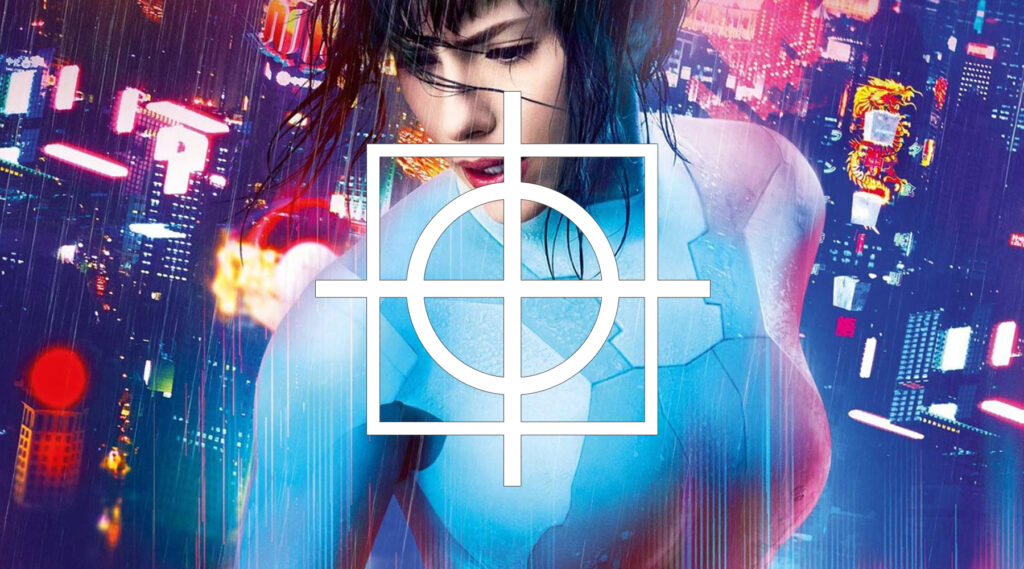
EN
If Memories could be Transplanted
1. The Plot
From the moment when the main female character of the film “Ghost in the Shell(攻殻機動隊, こうかくきどうたい, [0])” awoke from the coma and gained her conscience once again, it starts to show to us a journey how a person whose entire human body had been broken and abandoned and whose entire memory had been modified and transplanted with a fake version re-earned her meaning of existence. This is a story that a “non-human” or homo sapiens without traditional definitions regaining her new persona and independent conscience.
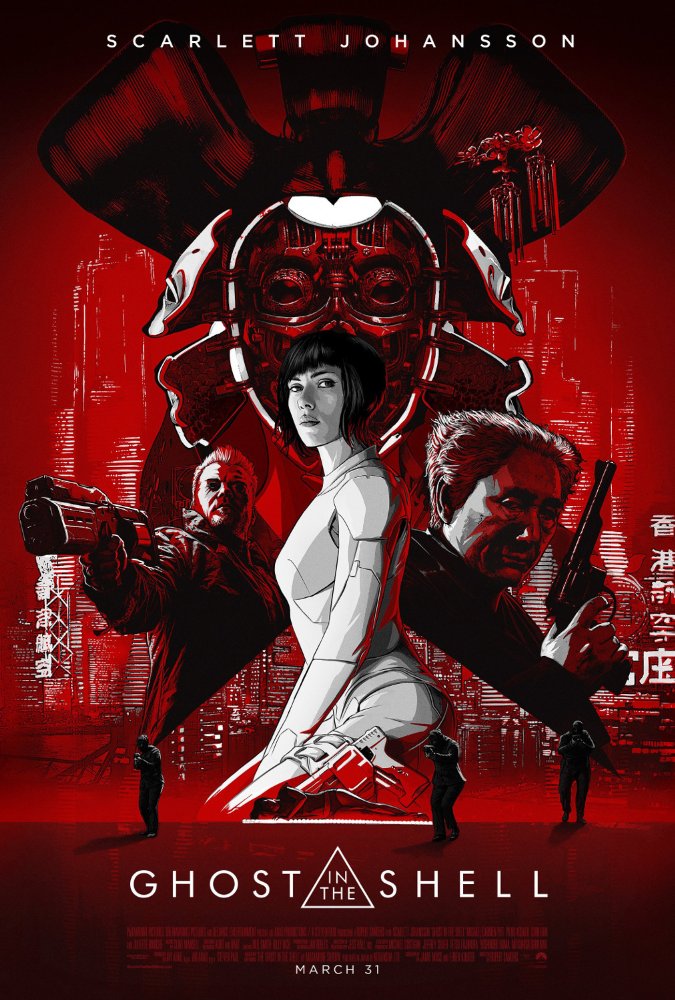
Poster of film “Ghost in the Shell”
2. The Questions
In the future world set by the film, by transplanting some hi-tech electronic equipments or even changing most part of the bodies into mechanical or electronic devices, human can get some skills or performance that our natural bodies once can never imagine. Though with the new technologies, arising human’s serious doubt on his/her self-signification of existence and deep distrust of the outside world: if our self-conscience is not always bounded with our bodies together, which has been generating and growing up since we were born onto the earth, if conscience itself is not a material existence independent of our bodies, with all these non-human parts transplanted into our bodies, or even those devices transforming the exteriors forms and inner structures of ourselves, could they become some parts of the conscience and infused with the original conscience into a whole, or even be possible to replace the original ones?
Then, what is the “Ego/Self”?
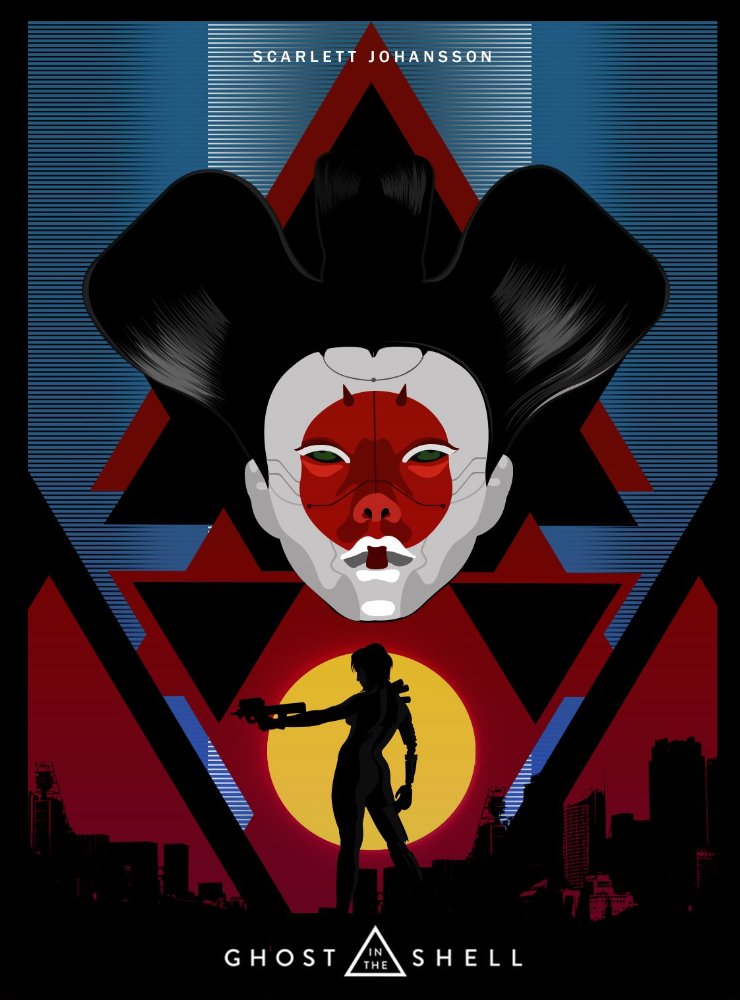
Poster of film “Ghost in the Shell”
3. Who Art Thou
If we can say that the “self-concept” is based on the accumulation of personal memories and experiences, the evaluation and recognition of personal values, the estimation of ideal or possible self in the future, all the cognitions, reflections and precipitations of one’s memories, experiences, values and ideal expectations are the possible fertile soils and vast oceans for generating the self-conscience.
4. Allegory of the Cave
“Cogito, ergo sum (Je pense, donc je suis. [1], – René Descartes [2]).” Without self-reflection, without thinking about the relationship between ourselves and the universe, the nature and the outside world, human can never proof the signification or define the value of our self-existence; without self-reflection, human can never alter or adjust the relationship between themselves and the exteriors world for the past thousands of millions of years, never evolute and develop, or neither can we sustain the bloodline of our race and create the civilization nowadays in case of facing and encountering so many difficulties or disasters in the history. In some significations, the world itself is merely just some reflection of our self-consciences, we have also created a kind of interactive images reflecting the cognition of the outside world. And this image of the world, is just the “Allegory of the Cave(Republic, Res publica, Πολιτεία, 514a–520a, [3])” that mentioned by ancient Greek philosopher Plato (Πλάτων)— the world is just only some blurry phantoms and shadows casted on the wall in a gloomy, dark and deep cave: we have created the self-conscience and the conscience of the world in tinkering and pondering. The world casts its reflected images while we have also mingled the reflection of our self-cognition by our conscience. In this way, we, as human, have earned the existential signification of the self-reflection, and so will the relationship between the self-conscience and the exteriors world and the position of ourselves in it.
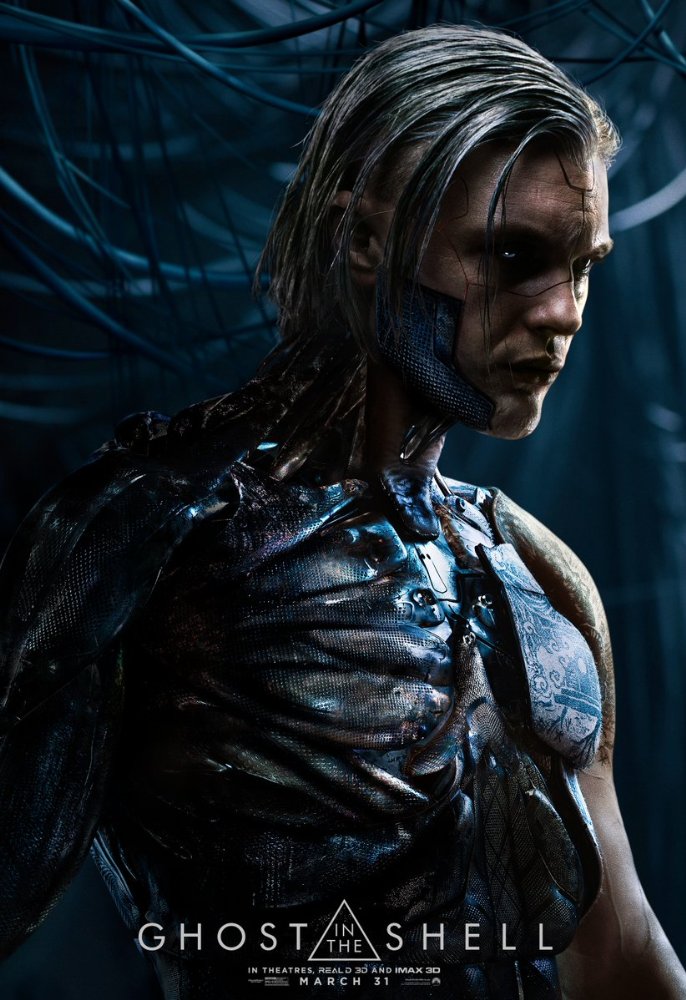
Poster of film “Ghost in the Shell”
5. Signification to be Born as a Human
The main female character’s brain is not only transplanted into a complete artificial body, but also her whole memories have been suppressed, washed and transplanted with a totally different version. If we can say that the memories and experiences have founded, formed and shaped the personæ and consciences, the irrelevant, artificially transplanted memories can also form and shape a specific persona. If modifying the history is to interrupt and change the mémoires collectives (collective memories) of a race/ethic group and later forming and shaping the characteristic of the race/ethic group, transplanting the memories is just to manipulate the memories and control the minds and the personæ. When the Major(少佐, しょうさ, [4]) had been initialized with her new body, her memories had also been formatted[5], and an entire new persona has been created within her. But just like the various, different layers and strata in the earth, our memories can be divided into different layers, too. There are superficial, temporary shallow memories, which we can compare to the RAM (Random-access Memory, [6]) in the modern computer, and there are also some deep memories hidden in the unknown corners of the immense ocean of conscience, waiting for us to discover— only at some specific moments, all those cached memories in the dark corners would arise and swim from the profound abyss, flowing and flying ephemerally in the flash while falling into the visions of ours. The remaining pieces and broken smashes of Killian’s past memories are emerging in front of her from time to time, stubbornly reminding her to trace back her past life, urging her onto the route to discover her real past. Indeed, all lies and ghosts can never stop a hot and passionate heart to uncover the truth, though might be concealed, deceived or blinded sometimes, she certainly will find out the truth with doubts, speculations and discoveries.
6. The Multi-Dimensioned You
If memory itself does have different layers, so do the created personæ. The old and new personæ will interlaced with each other, mingled together to form a totally different, free and multi-layered new persona. Perhaps different layers in the persona may result in chaotic personæ, but more possibly they will bring multiply personæ, or even a persona with different visages, different abilities and different characters. We can not forget that each persona may not have the memories or characters of another in some specific conditions: an elegant, quiet and polite common gentleman might transform himself into a blood-thirsty, tyrannical, cruel and crazy demon in the dark banquet for the insane mob; a man totally forgetting his cruel and crazy experiences will be a perfect “innocence” without any feasible motives. Only when another persona awakes, the former memories and experiences might be picked-up and reconnected. The main female character has been transformed into a cold yet adventurous special soldier with unique abilities to master all guns and weapons, along with a supreme power in martial art. Not only have her body and appearance been transplanted and transformed, but also her former character— only through some cracks in the hallucinations of the memories, she can hardly catch the glimpses of her faded shadows and gestures in her once rebellious, yet soft and delicate period as a teenage girl.
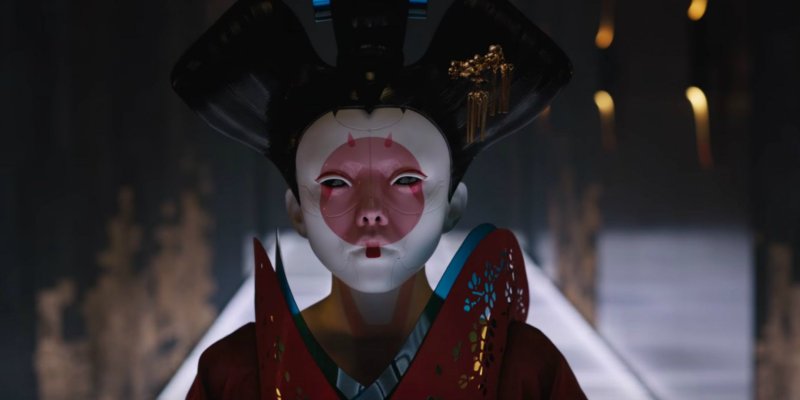
Still from film “Ghost in the Shell”
7. Tiny Game of God
If the foundation of our personæ is based on the personal experiences, the experiences can contribute a lot to the possibilities of our life. If memories and experiences can formulate new skills and abilities, then the transplanted memories and experiences can also bring new skills and abilities without learning: earning the precise goal by practicing shooting soccer for ten thousand times; gaining the freedom to write calligraphy by hanging the hands day after day; getting the vigorous and perfect voice by oral practice in every single morning, all of them can be easily obtained by inserting some modulars into your own body. If our bodies have memories, just like the amputated patients will still have the illusions of their disappeared limbs long after the surgeries, our bodies will react by instinct after long period of stimulation and practice of conditioned reflex, the brain is not the sole loader for our memories and experiences— the film has depicted a common man/woman gaining additional abilities far more beyond the limitation of his/her talent or physiology by transplanting external limbs or additional auxiliary equipments into his/her body. The paradox of non-repeated individual experiences has no effects any more, the modular design of the equipments can even make the human act like machines with different functions to fit into different usage/living scenarios: we can change our legs into wheels when we need to run fast; we can replace our hands with some sharp claws with great ability to grasp when climbing; we simply just need to activate the X-ray function in our man-made eyes when we want to inspect the situations next door. Transplantation (equipments, bodies and memories) will grand human some creative power of God.
8. Science & Technology: Pandora’s Box
Confronting the future developments and incontrollable inventions and innovations, have we ever released some unknown monsters when we open Pandora’s Box? How will these revolutionary inventions have influences on the human civilizations and the inherent social moral rules and systems? In the future world depicted by the film, in the society controlled and dominated by a few conglomerates, consortiums and monopoly groups, common people and human subspecies like artificial man and half-man/robot are all living together in the same social space, how can we solve the conflicts in ideologies and moral dilemma brought by this situation? Scientific innovations and revolutions can occur over one night, yet it may take generations to adjust and change the ideology. Different human races with different cultural and historical backgrounds, different religions and social beliefs can give birth to conflicts and contradictions, how can the great gap between “human” and “non-human” be bridged with ease? The man with built-in micro super-computer in brain has inborn advantages of dealing with the massive, big data, is that fair to other common people? What can we do when the men with powerful mechanical limbs assault the comparative weak common people? How will the law define different kinds of human and set a comparative fair law for all? In an epoch with commonly transplanted electronic equipments, will those insisting on keeping their original, native human bodies be discriminated, will they be destined to be someone with little importance, prejudiced, bullied, humiliated and suppressed all through their lives? In another word, will the right to maintain human’s original, complete and pure yet delicate and fragile carbon-based body only be a special privilege and symbol belonging to some high-rank social members in such an era? Will the inherent social classes and ranks with their associated discriminations and prejudices still determine our judgements in this times? The forever online equipments can also bring new chances for emerging network related crimes, money laundering and terrorism activities, perhaps you may never know that someone passing-by is a puppet whose chip in the brain had been secretly penetrated, intruded, hacked and transplanted with some malicious softwares and controlled by crackers to perform suicide attacks later? In addition, the ubiquitous, commonly distributed electronic equipments make the massive surveillance in real time just a piece of cake, in case that all the immense personal data generated by them are secretly collected, saved and analyzed by some conglomerates, consortiums or government agencies, how can we limit and stop such behaviours and activities violating and intruding personal privacy and human rights?— In this completely digitalized epoch, will the “Big Brother [8]” of Gorge Orwell [7] realize the future dreams of Aldous Huxley’s [9] “Brave New World [10]” in the splendid suite of conglomerates, consortiums and monopoly groups?
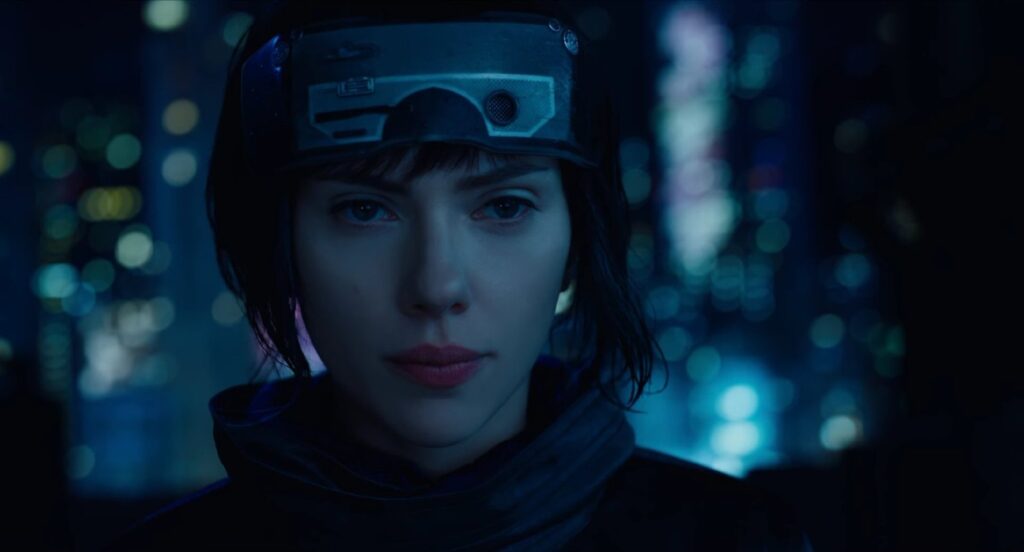
Still from film “Ghost in the Shell”
9. About the Future
With the fast development of artificial intelligence(A.I. [11]), we should believe that one day such scenes in our social life will never appear strange or weird. In the meantime of aiding/serving human, the artificial intelligence has also sewed a seed for possible gigantic change for tomorrow. The development in clone technology and high-performance chip will unfold a seductive scroll of the future: perhaps, a touching and moving beautiful woman passing-by in one early morning is only an advanced clone version of a famous historical lady; an eye-catching sport star in the arena is an artificial man with transplanted special chips and strengthened limbs— How will the transplanted external equipments and artificial intelligence influence on the individual’s persona? If w can say “Cogito, ergo sum (Je pense, donc je suis)”, isn’t the process of calculating data just another kind of thinking? In such a way, the artificial intelligence and related auxiliary equipment will facilitate the emergence of new kind of mixed-personæ. That is to say, the equipments and artificial intelligence will influence the common signification of human conscience. The artificial intelligence will even gain some independent consciences finally, and they relationship with human will be much more complicated, subtile and full of variables. They will never limit themselves and satisfy themselves to defeat human only in the game Go(圍棋)— as for the answer to the problem wether they will replace human entirely lies in how we make them. After all, the future will certainly be what our hands have shaped.
Perhaps, memories and consciences are just merely some illusions and phantoms generated from tens of millions of years of human evolution, while the fleshes and bodies, are merely some small containers that our souls living inside, loading all of these fantasies mentioned above…
2017 June 13~16, 2022 March 21
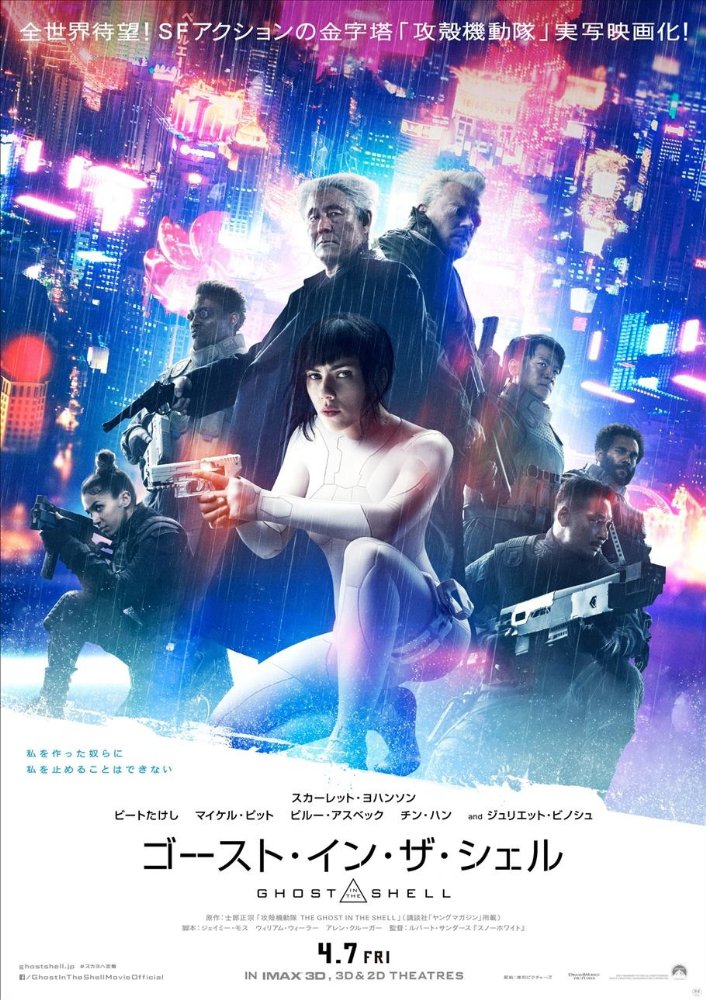
Poster of film “Ghost in the Shell”
Notes
[0]. Ghost in the Shell is a Japanese cyberpunk media franchise based on the seinen manga series of the same name written and illustrated by Masamune Shirow. The manga, first serialized in 1989 under the subtitle of The Ghost in the Shell, and later published as its own tankōbon volumes by Kodansha, told the story of the fictional counter-cyberterrorist organization Public Security Section 9, led by protagonist Major Motoko Kusanagi.
[1]. Cogito, ergo sum est une locution latine signifiant « Je pense, donc je suis ». Employée en français par le philosophe et mathématicien René Descartes dans le Discours de la méthode (1637).
[2]. René Descartes est un mathématicien, physicien et philosophe français, né le 31 mars 1596 à La Haye-en-Touraine, aujourd’hui Descartes, baptisé le 3 avril 1596 dans l’église Saint-Georges de Descartes2, et mort le 11 février 1650 à Stockholm.
[3]. The Republic (Πολιτεία, Politeia; Latin: De Republica) is a Socratic dialogue, authored by Plato around 375 BC, concerning justice (δικαιοσύνη), the order and character of the just city-state, and the just man. It is Plato’s best-known work, and has proven to be one of the world’s most influential works of philosophy and political theory, both intellectually and historically.
[4]. Major (少佐, しょうさ), is a military rank of commissioned officer status, with corresponding ranks existing in many military forces throughout the world. When used unhyphenated and in conjunction with no other indicators, major is one rank senior to captain, and one rank below lieutenant colonel. It is considered the most junior of the field officer ranks.
[5]. Disk formatting is the process of preparing a data storage device such as a hard disk drive, solid-state drive, floppy disk or USB flash drive for initial use. In some cases, the formatting operation may also create one or more new file systems.
[6]. Random-access memory (RAM) is a form of computer memory that can be read and changed in any order, typically used to store working data and machine code.
[7]. George Orwell, Eric Arthur Blair (25 June 1903 – 21 January 1950), known by his pen name George Orwell, was an English novelist, essayist, journalist and critic. His work is characterised by lucid prose, biting social criticism, total opposition to totalitarianism, and outspoken support of democratic socialism.
[8]. Nineteen Eighty-Four (1984) is a dystopian social science fiction novel and cautionary tale written by English writer George Orwell. It was published on 8 June 1949 by Secker & Warburg as Orwell’s ninth and final book completed in his lifetime. Thematically, it centres on the consequences of totalitarianism, mass surveillance and repressive regimentation of people and behaviours within society. Orwell, a democratic socialist, modelled the totalitarian government in the novel after Stalinist Russia and Nazi Germany. More broadly, the novel examines the role of truth and facts within politics and the ways in which they are manipulated.
Big Brother is a fictional character and symbol in George Orwell’s dystopian 1949 novel Nineteen Eighty-Four. He is ostensibly the leader of Oceania, a totalitarian state wherein the ruling party, Ingsoc, wields total power “for its own sake” over the inhabitants. In the society that Orwell describes, every citizen is under constant surveillance by the authorities, mainly by telescreens (with the exception of the Proles). The people are constantly reminded of this by the slogan “Big Brother is watching you”: a maxim that is ubiquitously on display.
[9]. Aldous Leonard Huxley (26 July 1894 – 22 November 1963) was an English writer and philosopher. He wrote nearly 50 books—both novels and non-fiction works—as well as wide-ranging essays, narratives, and poems.
[10]. Brave New World is a dystopian social science fiction novel by English author Aldous Huxley, written in 1931 and published in 1932. Largely set in a futuristic World State, whose citizens are environmentally engineered into an intelligence-based social hierarchy, the novel anticipates huge scientific advancements in reproductive technology, sleep-learning, psychological manipulation and classical conditioning that are combined to make a dystopian society which is challenged by only a single individual: the story’s protagonist. Huxley followed this book with a reassessment in essay form, Brave New World Revisited (1958), and with his final novel, Island (1962), the utopian counterpart. The novel is often compared to George Orwell’s Nineteen Eighty-Four (published 1949).
[11]. Artificial intelligence (AI) is intelligence demonstrated by machines, as opposed to the natural intelligence displayed by animals including humans. Leading AI textbooks define the field as the study of “intelligent agents”: any system that perceives its environment and takes actions that maximize its chance of achieving its goals.
聲明: 本篇音樂來自“伊斯·達納(Aes Dana)”的《記憶之殼(Memory Shell)》第二首“虹膜旋轉(Iris Rotation)”, #inre014, Ultimae Records(2004), 《攻殼機動隊》電影預告片及截禎來自國際網路, 版權屬於其所有者; 其它文字、翻譯及圖片均為原創,歡迎轉發,請勿用於商業用途,謝謝!
